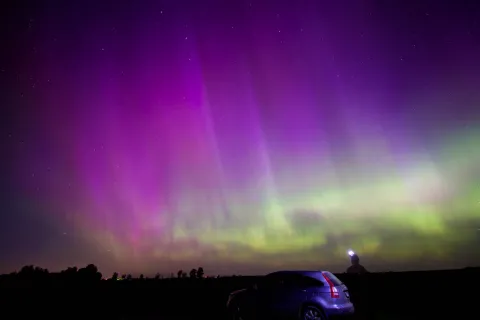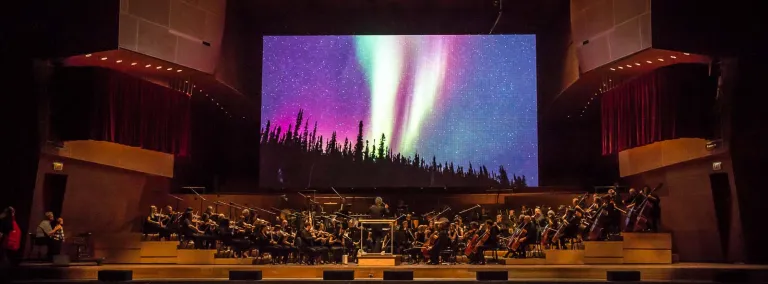Neutrino Day Preview
Neutrino Day: A Cosmic Symphony will highlight the value of collaboration between the arts and science
Above Earth’s magnet poles, color dances in the skies, creating magnificent light shows that can be seen, sometimes, for thousands of miles. Today, we know those lights are caused by collisions between electrically charged particles from the sun and gaseous particles in the Earth’s atmosphere; however, long before science discovered this, humans had to create their own stories.
“For millennia humans explained the origin of the Northern Lights with legends—many of them related to the souls of the departed,” said Dr. Jose Francisco Salgado, executive director and co-founder of KV 265, a non-profit science and arts education organization.
At this year’s Neutrino Day: A Cosmic Symphony, astronomer Salgado will collaborate with the Black Hills Symphony Orchestra (BHSO) to present “The Legend of the Northern Lights,” a film that combines visual imagery and music to tell the story behind this phenomena.
“Music and science at their best are collaborative. They both thrive in an atmosphere of a cross-fertilization of ideas,” said Bruce Knowles, music director of BHSO. “I will be curious to see what kind of impact our performance of ‘The Legend of the Northern Lights’ will have on our scientific audience and performing artists alike.”
Neutrino Day, Sanford Lab’s free science festival, takes place on Saturday, July 13, at locations throughout the City of Lead, including Sanford Lab, Sanford Lab Homestake Visitor Center, the Lead/Deadwood Arts Center, the Historic Homestake Opera House, the Lead Library and the All In One Events Center.
The festival includes hoistroom tours, science activities and exhibits, live video chats with scientists at CERN and underground at Sanford Lab and perennial favorite “Science Steve” Rokusek. In the keynote presentation, Salgado will discuss the value using multimedia to communicate science in engaging ways. This keynote will introduce concepts explored in the “The Legend of the Northern Lights,” featuring the BHSO.
Salgado’s Science & Symphony films are collaborations with orchestras, composers and musicians intended to invoke a sense of wonder about the Earth and the Universe. “The Legend of the Northern Lights” was a collaboration with composer Christopher Theofanidis; it premiered in 2012 with Grant Park Orchestra in Chicago, IL.
“I choose my topics based on objects or phenomena that I find fascinating and visually appealing,” Salgado said. “Astronomy and many Earth sciences are very visual fields with a lot of imagery available from scientific institutions. The rest of the material needed for the films is usually photographed by me.”
Salgado’s films have been presented at more than 350 concerts and lectures, reaching a combined audience of more than 400,000 people in 18 countries. He has worked with the Chicago Symphony Orchestra, Boston Pops, the San Francisco Symphony, New World Symphony and the Orchestra Teatro Regio Torino. His first two films were named by the International Astronomical Union and UNESCO as Special Projects for the International Year of Astronomy (IYA2009). In 2012 his film "Gustav Holst's The Planets" was chosen for Ravinia Festival's One Score, One Chicago initiative.
This year’s Neutrino Day will also feature a video conference with the CMS experiment at CERN and a talk with Majorana Demonstrator researcher Cabot-Ann Christofferson who will present “The Case for Curiosity.”
“It’s such an exciting opportunity for us to highlight the value of connecting the arts and science,” said Mike Headley, executive director of Sanford Lab.

